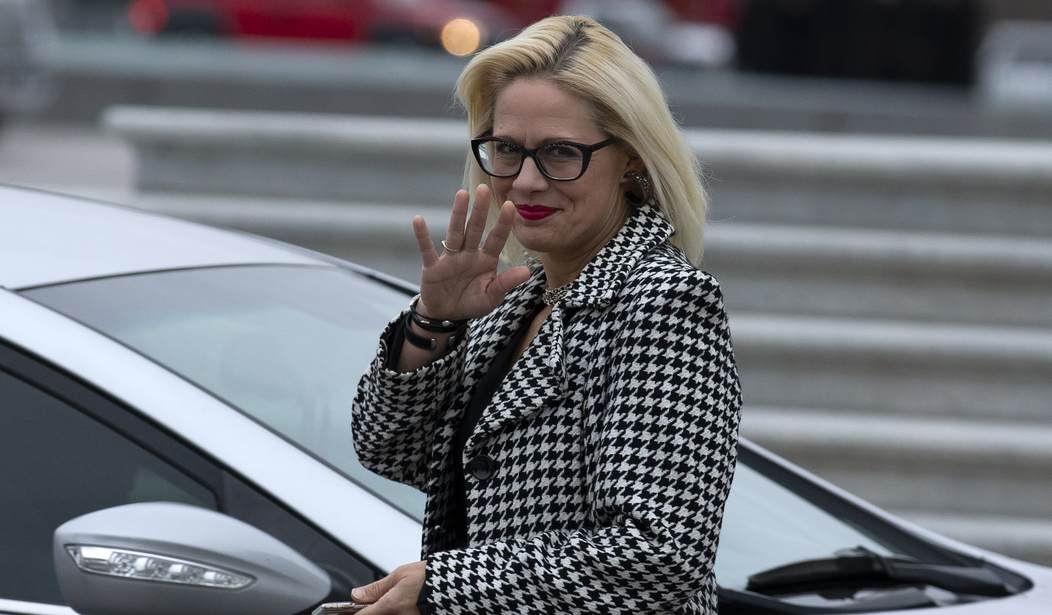“I’m not mysterious,” Kyrsten Sinema told her Senate Democrat colleagues, according to Politico. Nor is she inclined to get steamrolled by Chuck Schumer or Nancy Pelosi — not when she’s dealing directly with Joe Biden. Sinema plans to stick to her guns on both policy and price tag when it comes to the reconciliation-based boondoggle:
More is known about Manchin than Sinema, and for a good reason: While Manchin has been willing to discuss his priorities in detail with his colleagues in the Senate, Sinema only negotiates with the White House.
“I’m not going to share with you or with Schumer or with Pelosi,” she told one Democratic senator recently. “I have already told the White House what I am willing to do and what I’m not willing to do. I’m not mysterious. It’s not that I can’t make up my mind. I communicated it to them in detail. They just don’t like what they’re hearing.”
That’s not the only headache Democratic leadership has with the two most vocal opponents to the bill within their own caucuses. It turns out that there really isn’t a “Manchinema” after all. Sinema and Joe Manchin have different demands, and that makes a resolution even more difficult than presumed:
Part of solving the Manchinema puzzle is that the 74-year-old former governor from a coal state and the 45-year-old former Green Party activist from Arizona are at odds on some major policies.
“Manchin and Sinema want very different things, both in terms of revenue and programs,” said a source close to Biden who spent the last few days talking to senior White House officials. “If you just took their currently presented red lines you wouldn’t have enough left to get this past progressives in the House and Senate. It wouldn’t raise enough money and it wouldn’t do enough big programs.”
Well, yes, and we didn’t need an anonymous source in the White House to tell us that. Sinema and Manchin haven’t been mysterious at all on their “presented red lines.” Manchin has openly declared his to be no higher than $1.5 trillion, and Sinema has said it needed to be significantly lower than the current spending levels proposed. Why this needed to be said anonymously to Politico when it’s been explicit and patently obvious for weeks defies explanation.
One has to wonder now whether the inflation news today makes the “Manchinema” position even stronger. Spending massive amounts of money on entitlements that are more or less insolvent already means more printing of money. That will become even more evident when Democratic tax-increase projections fall far short as incentives force people to avoid tax-creating activities. Given all of the other inflationary pressures at the moment, even the spending in the $1.2 trillion bipartisan infrastructure bill looks like a foolish enterprise, especially since the funds from the previous COVID-19 stimulus/relief bills have yet to be fully dispersed.
Manchin probably cares more about that than Sinema, but the rapid spike in inflation this year certainly gives her room to dig in on her current positions. It also raises the question as to whether Biden and Schumer really have 48 votes for the reconciliation bill, as Bernie Sanders and other progressives claim. Sinema’s colleague Mark Kelly has been veeeerrrrry quiet on this, and given that he’s up for re-election next year, it seems almost impossible to think he’d vote yes on a bill that’s too progressive for Sinema.
Kelly may not be the only one rethinking the Bernie-driven spending spree. Jon Tester might be thinking twice about it in Montana too even though he’s not up for election any time soon, especially with the inflation figures today. Perhaps a few other Senate Democrats who have to face voters a lot sooner than Tester could get cold feet too. Michael Bennet has to defend his D+3 Colorado seat, and Maggie Hassan is already facing a tough fight in New Hampshire against John Sununu. Catherine Cortez-Mastio wants to win in libertarian-minded Nevada, and backing a massive government spending bill to benefit practically everyone else doesn’t sound like a winning message. The longer this debate drags on, the worse it gets for all of these vulnerable incumbents, too. It might even doom Democrats’ hopes to pick up an easy seat in Pennsylvania and a tougher one in North Carolina as the party careens to the radical Left.
The upshot here is that no one’s budging, and at least so far, no one’s buying the budgetary sleight-of-hand Pelosi floated this week. This is why Democrats should have asked these questions before floating this $3.5 trillion boondoggle rather than afterward — and have been mindful of the math of an evenly split Senate and a nearly evenly split House.








Join the conversation as a VIP Member